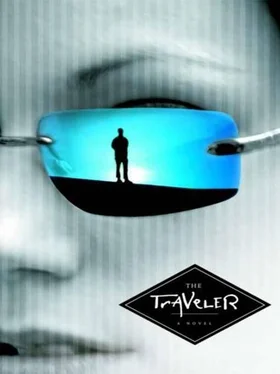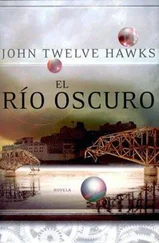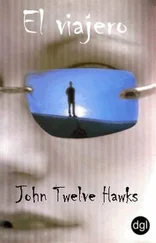Opening her eyes, she turned her head slightly and looked across the room at Gabriel. His head was on the pillow and his body was a soft form beneath the sheet. Maya wondered if he had lots of girlfriends back in Los Angeles who flattered him and said “I love you.” She was suspicious of the word love . They kept using it in songs and television commercials. If love was a slippery, deceitful word-a word for citizens-then what was the most intimate thing a Harlequin could say to another person?
Then the phrase came back to her, the last thing she had heard her father say in Prague: I would die for you .
There was a creaking noise as Gabriel moved restlessly on his bed. A few minutes passed, and then he propped his head up on two pillows. “You got angry when we were eating lunch this afternoon. Maybe I shouldn’t have asked all those questions.”
“You don’t need to know about my life, Gabriel.”
“I didn’t have a normal childhood either. My parents were suspicious of everything. They were always hiding or running away.”
Silence. Maya wondered if she should say something. Were Harlequins and the people they protected supposed to have personal conversations?
“Did you ever meet my father?” she asked. “Do you remember him?”
“No. But I do remember seeing the jade sword for the first time. I was probably eight years old.”
He remained silent and she didn’t ask any more questions. Some memories were like scars that you kept hidden from other people. A trailer truck passed the motel. A car. Another truck. If a vehicle turned into the courtyard, she would hear tires crunching across the loose gravel.
“I can forget about my family when I’m jumping out of a plane or riding my bike.” Gabriel’s voice was quiet, the words absorbed by the darkness. “Then I slow down and it comes back again…”
“All of my early memories are about riding in our car or pickup truck. We were always packing our bags and leaving. I guess that’s why Michael and I were obsessed with having a home.
“If we lived in one place for more than a few weeks, we’d pretend we were going to be there forever. Then a car would drive by our motel more than twice or a gas station attendant would ask Father an unusual question. Our parents would start whispering to each other and they’d wake us up at midnight and we’d have to get dressed in the darkness. Before the sun came up, we’d be back on the road, driving to nowhere.”
“Did your parents ever give you an explanation?” Maya asked.
“Not really. And that’s what made it so scary. They’d just say ‘It’s dangerous here’ or ‘Bad men are looking for us.’ And then we’d pack and leave.”
“And you never complained about this?”
“Not in front of my father. He always wore shabby clothes and work boots, but there was something about him-a look in his eyes-that made him seem very powerful and wise. Strangers were always telling secrets to my father as if he could help them.”
“What was your mother like?”
Gabriel was silent for minute. “I keep thinking about the last time I saw her before she died. It’s hard to get that out of my mind. When we were little she was always so positive about everything. If our truck broke down on a country road, she’d take us out into the fields and we’d start looking for wildflowers or a lucky four-leaf clover.”
“And how did you behave?” Maya asked. “Were you a good child or mischievous?”
“I was pretty quiet, always keeping things to myself.”
“What about Michael?”
“He was the confident older brother. If we needed a storage locker or extra towels from the hotel manager, my parents sent Michael to deal with it.
“Being on the road was okay, sometimes. We seemed to have enough money even though Father didn’t work. My mother hated television, so she was always telling us stories or reading books out loud. She liked Mark Twain and Charles Dickens, and I remember how excited we were when she read us The Moonstone by Wilkie Collins. My father taught us how to tune a car engine, how to read a map, and how not to get lost in a strange city. Instead of studying school textbooks, we stopped at every historical marker on the highway.
“When I was eight and Michael was twelve, our parents sat us down and told us they were going to buy a farm. We’d stop in little towns, read the newspaper, and drive out to farms that had ‘for sale’ signs on the lawn. Every place seemed okay to me, but Father always came back to the truck shaking his head and telling Mom that ‘The terms weren’t right.’ After a few weeks of this, I started to think that ‘the terms’ were a group of mean old women who liked to say ‘no.’
“We drove up to Minnesota, and then turned west toward South Dakota. At Sioux Falls, Father learned about a farm for sale in a town called Unityville. It was a nice area with rolling hills and lakes and fields of alfalfa. The farm was half a mile from the road, concealed by a grove of spruce trees. There was a big red barn, a few toolsheds, and a rickety two-story house.
“After a lot of haggling, Father bought the property from a man who wanted cash and we moved in two weeks later. Everything seemed normal until the end of the month, when the electric power went off. At first, Michael and I thought that something was broken, but our parents called us into the kitchen and told us that electric power and a telephone connected us to the rest of the world.”
“Your father knew you were being hunted,” Maya said. “He wanted to live apart from the Vast Machine.”
“Father never mentioned that. He just said that we were going to call ourselves ‘Miller’ and everyone was going to pick a new first name. Michael wanted to call himself Robin, the Boy Wonder, but Father didn’t like that idea. After a lot of talk, Michael decided to be David and I picked the name Jim, after Jim Hawkins in Treasure Island .
“That was the same night Father brought out all the weapons and showed us where each one was going to be stored. The jade sword was in our parents’ bedroom and we weren’t allowed to touch it without permission.”
Maya smiled to herself, thinking about the valuable sword hidden in a closet. She wondered if it had been propped up in a corner, next to some old shoes.
“An assault rifle was behind the couch in the front parlor and the shotgun was stored in the kitchen. Father kept his.38 in a shoulder holster beneath his jacket when he was working. This wasn’t a big issue when Michael and I were growing up. The guns were just another fact that we accepted. You said that my father was a Traveler. Well, I never saw him float away or disappear or anything like that.”
“A person’s body stays in this world,” Maya said. “It’s the Light within you that crosses the barriers.”
“Twice a year, Father would get in the pickup truck and go away for a few weeks. He always told us that he was fishing, but he never came back with any fish. When he was home, he would make furniture or weed the garden. Usually he’d stop working around four o’clock in the afternoon. He’d take Michael and me into the barn and teach us judo and karate and kendo with bamboo swords. Michael hated practicing. He thought it was a waste of time.”
“Did he ever say that to your father?”
“We didn’t dare challenge him. Sometimes my father would just look at you and know exactly what you were thinking. Michael and I believed that he could read our minds.”
“What did your neighbors think of him?”
“We didn’t know a lot of people. The Stevenson family lived on a farm that was farther up the hill, but they weren’t very friendly. An older couple named Don and Irene Tedford lived on the other side of the stream and they came over one afternoon with two apple pies. They were surprised that we didn’t have electricity, but it didn’t seem to bother them. I remember Don saying that television was a big waste of time.
Читать дальше












